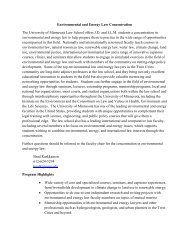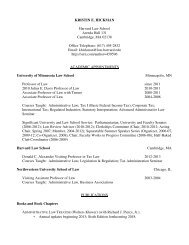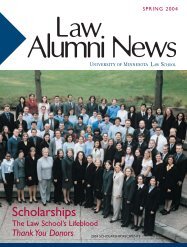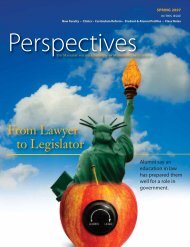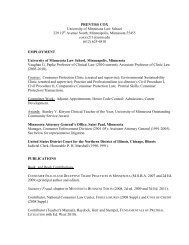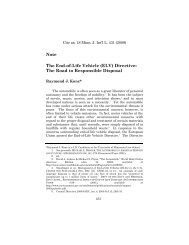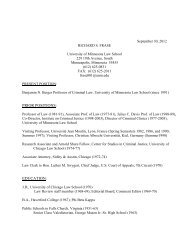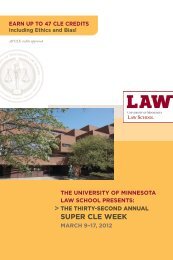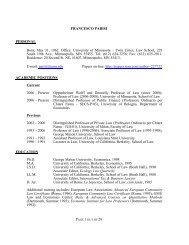Enabling Private Ordering - the University of Minnesota Law School
Enabling Private Ordering - the University of Minnesota Law School
Enabling Private Ordering - the University of Minnesota Law School
You also want an ePaper? Increase the reach of your titles
YUMPU automatically turns print PDFs into web optimized ePapers that Google loves.
2009] UMBRELLA CLAUSES 77<br />
<strong>of</strong> a concession and <strong>the</strong> expulsion <strong>of</strong> <strong>the</strong> investor were justified<br />
in <strong>the</strong> public interest, because <strong>the</strong> investor was suspected to<br />
have cooperated with revolutionary factions. However, <strong>the</strong><br />
Commission required compensation <strong>of</strong> <strong>the</strong> investor because “a<br />
nation, like an individual, is bound by its contract and although<br />
it may possess <strong>the</strong> power to break it, is obliged to pay <strong>the</strong><br />
damages resultant upon its action.” 209 Similarly, <strong>the</strong> French-<br />
Venezuelan Claims Commission in Company General <strong>of</strong> <strong>the</strong><br />
Orinoco Case accepted <strong>the</strong> entitlement <strong>of</strong> <strong>the</strong> host State to<br />
unilaterally terminate a mining concession that had created<br />
political tensions with a neighboring State. According to <strong>the</strong><br />
Commission, as <strong>the</strong> government’s “duty <strong>of</strong> self-preservation rose<br />
superior to any question <strong>of</strong> contract, it had <strong>the</strong> power to<br />
abrogate <strong>the</strong> contract in whole or in part . . . . It considered <strong>the</strong><br />
peril superior to <strong>the</strong> obligation and substituted <strong>the</strong>refore <strong>the</strong><br />
duty <strong>of</strong> compensation.” 210<br />
Similarly, <strong>the</strong> Tribunal in Czechoslovakia v. Radio<br />
Corporation <strong>of</strong> America confirmed that “any alteration or<br />
cancellation <strong>of</strong> an agreement . . . as a rule should only be<br />
possible subject to compensation to <strong>the</strong> o<strong>the</strong>r party.” 211 Notably,<br />
this case did not only refer to <strong>the</strong> cancellation <strong>of</strong> an investor-<br />
State contract but a modification <strong>of</strong> <strong>the</strong> content <strong>of</strong> a contract.<br />
Fur<strong>the</strong>rmore, <strong>the</strong> Tribunal emphasized that States could not<br />
restrict <strong>the</strong>ir obligation to regulate and interfere with investor-<br />
State contracts in <strong>the</strong> public interest by means <strong>of</strong> a contract<br />
with private individuals, but were restricted to make use <strong>of</strong> this<br />
power, subject to <strong>the</strong> requirement <strong>of</strong> compensation, in order to<br />
protect “public interests <strong>of</strong> vital importance.” 212 Similarly,<br />
several o<strong>the</strong>r arbitral decisions recognized <strong>the</strong> entitlement <strong>of</strong> <strong>the</strong><br />
State to terminate public contracts subject to paying<br />
compensation to affected foreign investors. 213<br />
More recently, <strong>the</strong> Iran-United States Claims Tribunal in<br />
Amoco International Finance Corporation v. Iran dealt with <strong>the</strong><br />
relationship between <strong>the</strong> stability <strong>of</strong> investor-State contracts<br />
and <strong>the</strong> responsibility <strong>of</strong> <strong>the</strong> State to attend to <strong>the</strong> public<br />
209. Oliva (Italy v. Venez.), 10 R.I.A.A. 600, 609.<br />
210. Company General <strong>of</strong> <strong>the</strong> Orinoco (Fr. v. Venez.), 10 R.I.A.A. 184, 280.<br />
211. Admin. <strong>of</strong> Posts and Tel. <strong>of</strong> <strong>the</strong> Republic <strong>of</strong> Czechoslovakia v. Radio Corp. <strong>of</strong><br />
Am. (Czechoslovakia v. Radio Corporation <strong>of</strong> America), 1932 Hague Ct. (Apr. 1), 30<br />
AM. J. INT’L L. 523, 531 (1936).<br />
212. Id.<br />
213. See Shufeldt Claim (Guatemala v. U.S.), 2 R.I.A.A. 1079, 1095 (1929);<br />
Norwegian Shipowners Claims (Norway v. U.S.), 1 U.N.R.I.A.A. 307, 338 (1922). See<br />
also Weil, supra note 3, 101 & 217 et seq.



